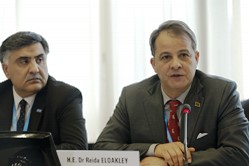WHO: 2 million Libyans in need for urgent health care

World Health Organisation
As Libya’s yearlong peace talks aimed at establishing a unity government stall again, the lives of millions of people needing urgent health care linger in the balance. WHO and health partners require a total of US$ 50 million in 2016 to meet the critical health needs of nearly 2 million people.
Speaking at a special briefing on Libya in Geneva, Dr Syed Jaffar Hussain, WHO Representative for Libya, urged, “We cannot wait for a political solution in order to respond, we need to act now. We need both financial resources and the international humanitarian community to step up efforts to help save the lives of children, mothers and the elderly who are most at risk. This is not about politics, it is about health needs.”
Since the escalation of the conflict in July 2014, violence and instability have spread to almost every part of the country, with more than 3 million people – nearly half of the total population – affected. Almost 2 and a half million people are in need of urgent humanitarian assistance, of which 1.9 million people have serious, unmet health needs.
“The health situation in Libya is rapidly deteriorating, with extensive displacement, damage and closure of health facilities in conflict areas. Repeated rounds of violence have not allowed for a proper recovery of the health system, which even prior to the crisis was struggling to meet the basic needs of the Libyan population,” said H.E. Dr Reida Oakely, Libya’s Minister of Health.
Haemorrhaging health workforce
Even bleaker, as the security situation deteriorates due to fighting, health personnel have fled the country. More than 80% of all nursing staff were evacuated in 2014. Attacks on health care workers also continue, with 5 health workers killed and more than 20 health facilities damaged in the past 18 months alone. Consequently, several aid and United Nations agencies have reduced staffing levels and moved international staff to neighbouring Tunisia in 2014.
Shortage of medical supplies
In addition to staff shortages, hospitals, laboratories, blood banks and other health facilities are increasingly unable to remain functional as they face shortages in medicines and other health supplies. Most of the medical warehouses in the east of the country have been destroyed or are partially functioning, including the main warehouse in Benghazi, which was destroyed at a time when it was at its peak accumulation of stocks.
Providing impartial health care
WHO is committed to providing health care to all people irrespective of their religion, political affiliation or nationality.
This is our moral obligation. “We are calling on all parties to guarantee unrestricted, long term delivery of humanitarian aid and unconditional movement of health workers,” affirmed Dr Hussain.
For 2016, WHO and health partners require US$ 50 million to respond to the needs of 1.9 million people in Libya. This funding will be used to strengthen the health system in 4 key areas.
- Improving access to basic life-saving primary and emergency secondary health care services through the provision of essential medicine, medical materials and technical support.
- Reducing communicable disease transmission and outbreak through detection and mitigation measures.
- Strengthening the existing health structure to avoid the collapse of the health system through capacity-building measures, referral system strengthening, infrastructure rehabilitation and the strengthening of data collection and information-sharing mechanism.
- Providing temporary assistance via mobile and medical outreach services.
Since November 2015, WHO has been able to reach almost 250 000 people through the provision of medicines, mobile clinics, health teams, provision of fuel and safe water. However, many more people need urgent aid, and much more needs to be done by WHO and partners to reach them. “We need to be able to reach all affected people to identify health needs, assess nutritional status, and ensure health services are available. If access for the provision of aid is not made immediately available, millions of people are at risk of facing a humanitarian and health disaster,“ added Dr Hussain.
How to submit an Op-Ed: Libyan Express accepts opinion articles on a wide range of topics. Submissions may be sent to oped@libyanexpress.com. Please include ‘Op-Ed’ in the subject line.
- Western Powers Welcome Libya’s Municipal Election Results - November 26, 2024
- Libya concludes presidency of MENWMDFZ - November 26, 2024
- LAIP seeks to reclaim major agricultural investment in Guinea - November 26, 2024


